The Stigma of Counseling...
stig·ma
(from Merriam and Webster Dictionary: http://www.merriam-webster.com/dictionary/stigma)
Counseling, as beneficial and available it may be to many individuals,
it’s still considered a taboo process; Especially for certain cultures. The
stigma that counseling carries affects old and young, black and white, male and
female individuals who struggle with the difficulty of admitting "I need
counseling". Why might counseling have a negative stigma attached?
- Counseling means I have a problem.
Many people struggle with making
that first phone call or inquiry to counseling services because to them if you
need counseling, you are admitting that you have a concern. Many individuals
avoid admitting they have any issues, concerns or difficulties simply due to PRIDE and FEAR. I tend to thank individuals for their humility and courage in
realizing that their mental health, their family, their jobs, etc., means more
to them than the pride & fear of sitting in the dark struggling with your
problems alone.
Think about a secret you may have,
either no one knows or only a few chosen friends know of it. Chances are you may
have refrained from telling others because you are ashamed, embarrassed and/or hurt
by this secret or you are afraid of how it may affect your relationships with
others, being judged or humiliated. One of the greatest attributes in
counseling is that it’s bound by its ethics and legality to keep what is
discussed CONFIDENTIAL*. In addition
to confidentiality, you are able to comfortably address issues with someone who
is UNBIASED and unable to JUDGE.
This means that an individual in counseling is able to receive feedback from a counselor
who is able to provide them with an honest and respectful opinion/solution from
a different perspective that the individual may not have even considered.
Many individuals are fearful to go
to counseling because of the biggest stigma; ONLY PEOPLE WITH SERIOUS ILLNESSES
go to therapy. Blame this stigma on television and movies that adapt exaggerated
views of how therapy takes place. Yes, individuals who are clinically diagnosed
with more severe disorders go to counselors (and psychiatrists), HOWEVER,
according to Christian Care Connection’s blog, here are the top (5) reasons why
individuals seek counseling:
·
Down
moods and depression
·
Marriage
or other relationship problems
·
Low
self-esteem
·
Need
to understand themselves better
·
Feel
anxious and / or suffering panic attacks
(From Christian Care Connection: http://www.christiancareconnection.com/top-10-reasons-for-counseling/)
Notice that the list
contains average struggles that everyone goes through from time to time.
I believe the purpose of counseling is to help individuals who are dealing with their issues gain clarity about themselves, use goal oriented treatment to change their behaviors and provide them with SUPPORT through their journey.
SUPPORT in my opinion is one of the greatest attributes of a counselor, and providing ENCOURAGEMENT in my opinion is one of my greatest tools as a counselor.
All in all, avoid getting bogged down in the stigma of counseling – and realize that you don’t have to deal with life’s complications and challenges alone. Humans are not built to deal with concerns alone but rather to communicate and encourage one another as we each go through difficult seasons in our life.
Counseling is YOU time. Many individuals don’t get the time to focus on themselves and their needs as they have others they are also concerned with and assisting. I stand by the notion that ‘In order to help someone else be stable, you need to be healthy and stable’. This includes mental health!
Are you going through a difficult season right now? Do you have various concerns/desires you want to address/achieve? Life’s stressors and unbalances affecting your life negatively? Do you think counseling will be beneficial for you? Click HERE to complete an online/confidential inquiry to get more information or to schedule a session today!
* Limits to confidentially include:
reports of harm to self or others, abuse of child/vulnerable adult, and court
ordered subpoenas.



